Dell Unfolds 2 Bendable Screen Prototypes at CES 2020
Like Microsoft and Lenovo, Dell’s also angling to get into bendable display computers.
We heard a lot of talk of foldable PCs last year from vendors like Microsoft and Lenovo, but those two aren’t the only ones trying its hands at bendy screens. Dell today detailed two concept designs it’s working on that show it’s not folding on the potential of foldable PCs.
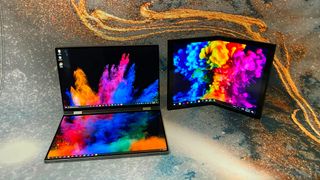
Dell showed Tom’s Hardware two foldable prototypes, the Ori and the Duet. As concepts, we don't know when or if they'll hit the market. But what it does tell us is that even more major PC vendors are currently contemplating a future where consumers will have another choice to make about their PC’s display outside of resolution, touch capabilities, size and refresh rate: to bend or not to bend?
Concept Ori: The Portable Foldable
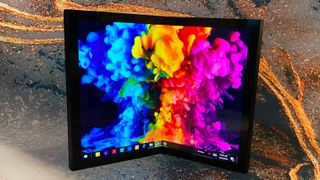
Ori is named after the paper folding art of origami. While this PC won’t quite bend it’s way into a paper crane, it does offer the type of portability that those interested in a foldable PC will likely crave.
Dell wouldn’t share much specs as it’s still working on the design, but the Ori concept we saw featured a 13-inch touchscreen allowing for four-finger touches. It’s also OLED, which points to deep blacks, excellent color and, likely, a hefty price tag. Of course, Dell may choose a cheaper panel type if it actually brings Ori to market.
Something about this new-age device makes it feel older, and that’s those thick bezels, similar to those on others we've seen. The whole foldable screen is framed by chunky, black plastic reminiscent of an older or work PC. However, these thick lines serve a purpose, allowing users to hold and manipulate the screen without having to lay a fingerprint on that pretty OLED display.
Concept Duet: Bendable Productivity
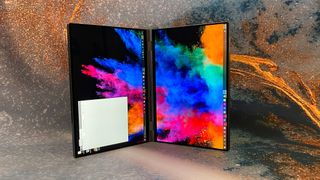
Where Ori is for the tech enthusiast on the go, the Duet is more geared toward professionals seeking a productivity machine, Dell told us. With its book-like view or the ability to shift into clamshell mode and view one long screen, Dell sees users using the Duet for tasks like reading magazines, opening multiple windows or making video calls while taking notes.
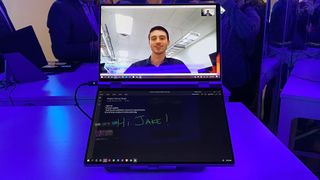
The Duet already has a lot more functionality than the Ori just in how it’s built. The prototype we saw included a clever snap-on keyboard, which prompts the display to shift upward so text isn’t hiding underneath. When not in use, the keyboard conveniently snaps onto the back.
Stay On the Cutting Edge: Get the Tom's Hardware Newsletter
Get Tom's Hardware's best news and in-depth reviews, straight to your inbox.
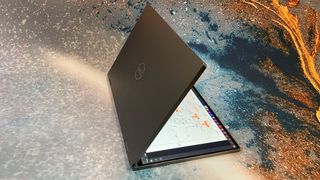
Unlike the Ori’s OLED screen, the Duet’s 13.4-inch screen was made with an LCD panel.
Unfolding the Future
As mentioned, Dell still doesn’t know if it’ll release the Ori, Duet or any foldable PC at all. It does, however, believe there is room for both products in the market, a spokesperson said.
A lot of these devices’ value will depend on how well the design works with apps. Microsoft is already working on WIndows 10X, an operating system (OS) specifically for foldable PCs, although Dell wouldn’t confirm it would use that OS.
In our time with the prototypes, both certainly had a wow factor and point to a lot of potential in terms of portable computing and multi-tasking. They’ll both need fine tuning in the OS and apps for smoother and more intuitive usage, and the Ori’s hinge-work required a little more force than I expected. But these are all things Dell is still experimenting with and tweaking. However, it can’t be emphasized enough how much durability and sturdiness will make or break (pun intended) any idea of a foldable PC takeover.
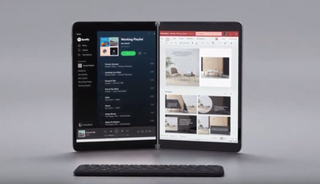
If Dell does start selling foldable PCs soon, it may have to contend meet the likes of the Surface Neo. Microsoft’s foldable is supposed to arrive during the 2020 holiday season and also uses a keyboard attachment and uses a book-like design like the Duet. There’s also Lenovo’s foldable PC, which looks pretty similar to the Ori and also has a 2020 release date.
Scharon Harding has a special affinity for gaming peripherals (especially monitors), laptops and virtual reality. Previously, she covered business technology, including hardware, software, cyber security, cloud and other IT happenings, at Channelnomics, with bylines at CRN UK.
Most Popular






